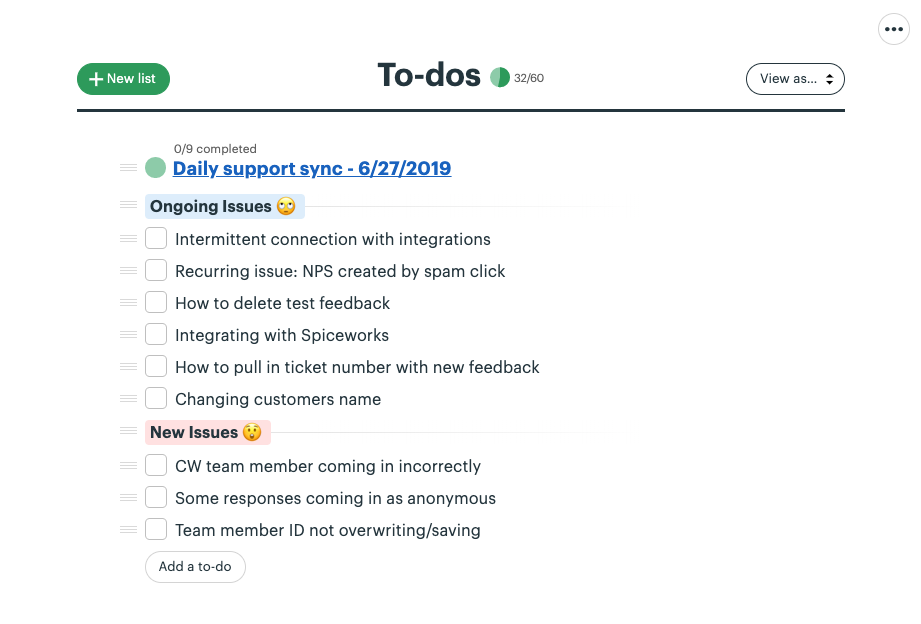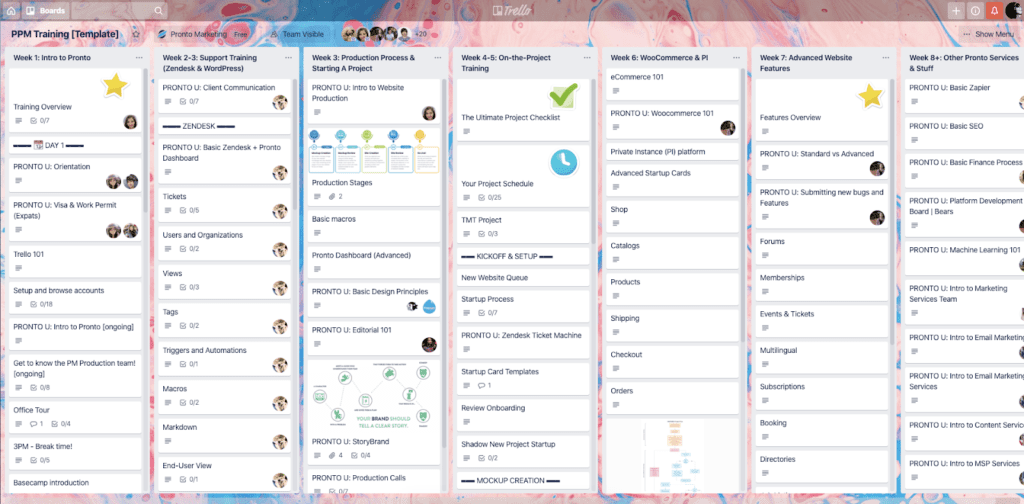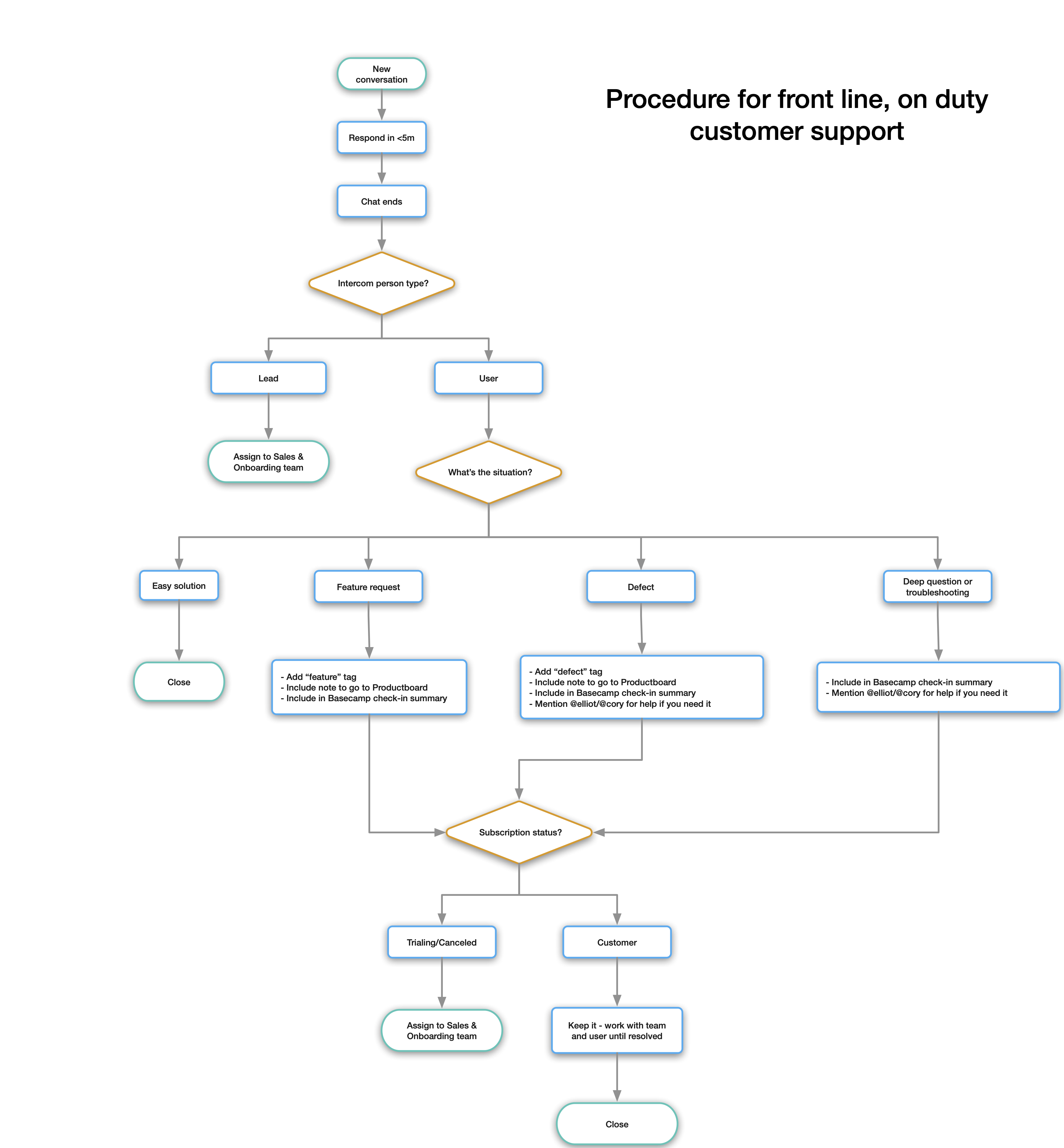News flash: customer service matters!
66% of consumers have cancelled a transaction due to poor customer service, and 33% say they switch to another seller after just a single instance of poor service.
American Express 2017 Customer Service Barometer
In today’s marketplace, providing exceptional customer service is one of the best ways to differentiate yourself from the competition. A traditional, reactive “customer service department” just doesn’t cut it anymore.
For over 10 years, the Simplesat team (and our parent company, Pronto Marketing) have been tuning workflows and methodologies with a relentless focus on wowing our customers.
Here are 7 things that have worked for us.
1. Refine your employee onboarding templates
Hiring great people just is not enough anymore. Building strong teams takes time, patience, and a never-ending conversation about how things work and how they can be improved.
It all begins with a thorough onboarding process.
Start by outlining your onboarding expectations. This will provide you with a clear idea of where new support agents should be at the end of their onboarding phase.
Four key areas to include:
- A detailed understanding of the products or services
- Knowledge of support workflow and policies
- How to respond to customers in specific situations
- Technical competencies
Store every document of the onboarding process in one place (we use Basecamp checklists, and Pronto Marketing uses Trello boards), so they’re easy to access and improve over time. Here are some great onboarding checklist ideas from Klausapp.
2. Batch issues, questions, and answers for team-wide syncs
If you’ve managed customer support agents before, you know how distracting a barrage of incoming questions through Slack or email can be. You owe it to your employees and customers to reply quickly, but interruptions are time consuming. And if answers are shared, they will benefit the entire team.
In order to fast-track the development of customer service skills, it’s essential to leverage your team’s knowledge and facilitate group learning.
Schedule regular team-wide syncs to answer questions and discuss pressing issues. Experiment with different frequencies to find the balance between the efficiency of giving your team quick answers, and the long-term benefit of them figuring things out on their own.
Your agents will be more inclined to find their own solutions if they know they need to wait for the next sync. But having the sync system in place ensures that questions will eventually be answered. You can also use these sessions to review other support-related announcements, such as a change to a workflow, or introducing a new tool.
At Simplesat, we do daily syncs around 9am. On Mondays, we combine the daily sync with a larger meeting about all service-related updates and issues.
We have recurring events setup in Basecamp that make it easy for team members to queue up questions for the agenda, so experts have time to prepare their answers.

3. Clarify roles but ensure some overlap
Overlap between Sales, Support, and other roles like Production and Q&A is critical in order for customers to not feel like they’re dealing with siloed departments.
With this overlap, it becomes even more important to define “who owns what”.
This should be an ongoing conversation, not just a one-time overview of the SOP manual.
We experience this at Simplesat as we scale our Sales and Support teams. We provide live chat support through our website and dashboard. Overlap can occur when Sales might help out with an existing customer, while Support can jump in to chat with a lead.
Below is a draft flow chart we use to help clarify “who owns what”, without sacrificing the overlap that ensures a good experience for the end-user.
4. Connect support agents with other team members for empathy and understanding
Have you heard comments like these from your team?
“The sales team are selling unrealistic deals that are too difficult to support.” 😱
“Developers always respond with ‘I can’t reproduce that on my machine.'” 🙄
These are symptoms of poor communication, not bad employees.
To prevent this from happening, make it easy for your support agents to connect with other teams to improve knowledge sharing and empathy.
This could mean having a monthly company-wide lunch, or having a dedicated chat room where they can ask questions of the respective teams. (e.g. #sales-qa, #dev-qa)
How we do it at Simplesat:
- After each demo call, the sales person posts a summary in Basecamp for all of Simplesat to see.
- Each team member posts a daily check-in about their shift, any issues they encountered, and the solutions they found.
- Sales and support team members attend our bi-weekly product sprint reviews. This is a chance to see the perspective of developers, and for developers to get direct feedback from front-line support.
5. Track and report top support KPIs
How do you go about determining whether your agents are delivering in their role? To measure performance, try looking at some of the following metrics:
- Time to first reply – Time between when a customer opens the chat, and the initial response by an agent.
- Full resolution time – First reply time is important, but ultimately customers are looking to get their issues resolved.
- Solved ticket CSAT – Embedding a one-click CSAT survey in a support follow-up email can keep your finger on the pulse when it comes to individual agent performance.
- NPS (Net Promoter Score) – Used to measure customer loyalty, send this to all customers each quarter.
And of course, Simplesat can help with the CSAT and NPS parts!
6. Provide agents with the “why” behind everything
Support agents shouldn’t do things simply “because that’s the way they were trained”. They need to be able to explain the logic behind your organization’s support actions. While well-defined internal processes should act as a guide, agents should feel empowered to do the right thing in order to satisfy your customers.
The Ritz-Carlton exemplifies this by permitting every employee to spend up to $2,000 to make any single guest satisfied.
Whether you choose to adopt a similar policy or not, it’s critical that your agents are given a clear path of escalation in order to deliver quick and effective solutions. They should feel comfortable to keep asking “why?” up your organization’s chain until a good answer is provided.
7. Focus on your customers!
While we hope that these tips help you improve your support teams, what’s most important is to keep the focus on an amazing experience for your customers.
Over time, you’ll refine a process unique to your teams and business.
Oh, and HAVE FUN! 🎉
Try our software now with a free 30-day trial at no cost to you. Sign up here in 30 seconds. No credit card required. Easy to set up.
About Simplesat: Simplesat is the leading omnichannel survey app designed to enhance customer feedback management across various platforms, including Zendesk, Salesforce, and Gladly. Trusted by businesses worldwide, Simplesat delivers actionable insights that drive business growth and customer satisfaction.











